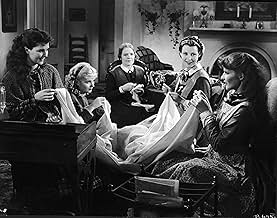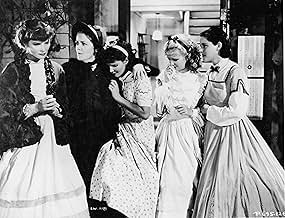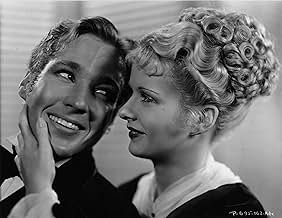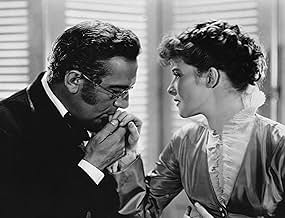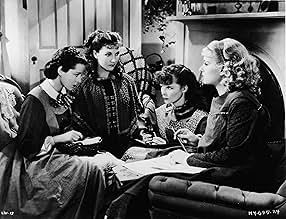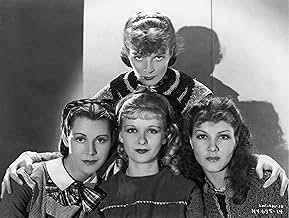VALUTAZIONE IMDb
7,2/10
8308
LA TUA VALUTAZIONE
Una cronaca della vita di sorelle che crescono nell'America del novecento.Una cronaca della vita di sorelle che crescono nell'America del novecento.Una cronaca della vita di sorelle che crescono nell'America del novecento.
- Regia
- Sceneggiatura
- Star
- Vincitore di 1 Oscar
- 7 vittorie e 4 candidature totali
John Lodge
- Brooke
- (as John Davis Lodge)
Samuel S. Hinds
- Mr. March
- (as Samuel Hinds)
Nina Borget
- Housekeeper
- (non citato nei titoli originali)
Francesca Braggiotti
- Dance Teacher
- (non citato nei titoli originali)
Luke Cosgrave
- Old Man
- (non citato nei titoli originali)
Recensioni in evidenza
From the opening titles displaying a snow covered Curier and Ives - like print underscored by a melody played on a tinkling spinet, this 1933 version of Louisa Alcott's beloved novel holds one in thrall. A Civil War era tale of a New England family's joys and tribulations centers on the March household : mother "Marmee" and her four daughters; Meg, Amy, Beth and Jo. The screenplay centers on each girl's commitment to "showing her father proud", father being a minister gone of f to war to meet the spiritual needs of the Yankee soldiers. Buoyed by their mother [ the ever perfect Spring Byington ] the girls learn the meaning of giving and sacrifice with a jollity that may be off-putting to 21st century viewers; but stick with it, for what this picture offers is nothing less than real life at its most joyful and painful. After a series of seemingly inconsequential events, the girls' placid lives are disrupted when a sibling takes ill. This section of the movie is riveting, due to the superb direction of George Cukor and Katherine Hepburn as the tomboyish Jo. The scene where Jo retreats to the attic, worried sick over the fate of her ill sister, is gut wrenching. Hepburn was just hitting her stride as a movie actress when this film came out. Not the typical glamour girl of the time, her odd beauty and diction translated into a strange alchemy when projected on a movie screen : she is unforgettable. The other actresses acquit themselves beautifully but the picture belongs to Hepburn. Lest you think all is dour and dull, this movie offers so much that is truly entertaining : a heartwarming homecoming scene; the March girls presenting a "play" in their living room to the consternation and delight of invited neighbors and several moments involving a cantankerous but lovable aunt [ the ubiquitous Edna May Oliver ]. The movie is properly accoutered with lovely interiors and authentic production design and costumes [ gabled houses and ivy covered porches; hoop skirts and muffs ]. The entire production is like a gift wrapped edition of the novel turned to celluloid! The icing on the cake, so to speak, is Max Steiner's spare, evocative music score, employing Beth's piano playing for family get togethers, parties etc., and orchestral "commentary" for dramatic, comic and action sequences. Only six years had passed since sound recording had revolutionized the film industry, but this "early talkie" uses the new technology very adeptly; although camera movement is minimal, the editing is very fluid. The sound, courtesy of old Western Electric, is fine, especially on the recent DVD release, where both aural and visual elements have been restored, assuring a great presentation. When a movie has the power to reach out over a span of seven decades and touch jaded hearts in another century, that is a sign of a classic. LITTLE WOMEN is a great American film.
The film might be more accurately titled "Little Woman", with Katherine Hepburn seizing the lead role, and never letting go. Otherwise, it's the story of four "Little Women" growing up, and finding love's direction. Hepburn (she's Jo) is sister to Joan Bennett (she's Amy), Jean Parker (she's Beth), and Frances Dee (she's Meg). Of their suitors, Douglass Montgomery (he's Laurie) gets the most action.
Ms. Bennett steals the actual acting honors with a performance that is natural and consistent; her voice and mannerisms are appropriately girlish, young womanish and, selfish. Ms. Hepburn plays girlish like she's had too many cups of coffee; additionally, she never looks even remotely "tomboyish"; looking, instead, like a ravishingly made-up MGM movie star. Ms. Parker rises out of her sick bed like a zombie, but is okay in other scenes.
Watching Hepburn being romanced by Mr. Montgomery and Paul Lukas is unnerving. The story does have some reasons to watch, however. The production is obviously top-of-the-line. Hepburn may not be in her best role, but it's not awful; she slows down and gets better after her character grows older. The script has well-written characters - Jo, Amy, and Laurie - who illustrate a sweet story of family, love, and friendship.
******* Little Women (11/16/33) George Cukor ~ Katharine Hepburn, Joan Bennett, Douglass Montgomery, Paul Lukas
Ms. Bennett steals the actual acting honors with a performance that is natural and consistent; her voice and mannerisms are appropriately girlish, young womanish and, selfish. Ms. Hepburn plays girlish like she's had too many cups of coffee; additionally, she never looks even remotely "tomboyish"; looking, instead, like a ravishingly made-up MGM movie star. Ms. Parker rises out of her sick bed like a zombie, but is okay in other scenes.
Watching Hepburn being romanced by Mr. Montgomery and Paul Lukas is unnerving. The story does have some reasons to watch, however. The production is obviously top-of-the-line. Hepburn may not be in her best role, but it's not awful; she slows down and gets better after her character grows older. The script has well-written characters - Jo, Amy, and Laurie - who illustrate a sweet story of family, love, and friendship.
******* Little Women (11/16/33) George Cukor ~ Katharine Hepburn, Joan Bennett, Douglass Montgomery, Paul Lukas
LITTLE WOMEN is quite possibly the one book written post-Shakespeare that has the most number of film adaptations to its credit. Louisa May Alcott's novel, after all, offers a fine host of roles, particularly for women--of the March girls alone, there's the eldest sister Meg; the frail but saintly Beth; spoilt baby of the family Amy; and last but most certainly not least, spunky tomboy Jo. (This is not to forget the smaller, but still integral, supporting roles of Laurie, Mr Lawrence, Professor Bhaer, and of course, Marmee March.) The story is an engaging one too, following the lives of the March sisters--in particular Jo--as they grow and deal with change, with love, and even with death. Even though the story itself is tied to a particular setting in the 1860s (and even then the historical setting is almost peripheral), the characters and their relationships with one another--siblings, parent/children, friends and lovers--are simply timeless. That's probably why the novel has seen as many attempts to have it committed to film as it has.
I hate to make a snap judgement, having not seen any more versions of Little Women than the 1994 one, but I believe that this version, made by RKO studios and starring a delightful Katharine Hepburn as Jo March, has every right to be considered the definitive film version of the Alcott novel. The writing, for one thing, is exceptional. Although never quite the novel's substitute, it condenses the book marvellously, sketching the characters and relationships of the girls quickly and efficiently, and never skipping over the best parts of the book (for example, Laurie's profession of love for Jo). Of course the screenplay will never measure up to the book--it is rare that a film could surpass the wealth of detail and beauty of description available from the written word. But nothing's perfect, and this screenplay, by Sarah Y. Mason and Victor Heerman, is as close as an adaptation can get while retaining its own distinct flavour as a film.
As for the casting, I have very few complaints about it, since Hepburn--all angles and attitude, all loud-voiced and tomboyish--is perfect as Jo and is ably supported by Frances Dee as Meg, Henry Stephenson as the sweetly paternal Mr. Laurence and Douglass Montgomery as Laurie (though he plays the role a tad too fey for my liking). Special praise must be reserved for both Jean Parker (Beth March) and Paul Lukas (Professor Fritz Bhaer): Parker for bringing an impossibly sweet and lovely character to life, and making the audience genuinely grieve for Beth when she takes her leave of her family; Lukas for managing to avoid making Professor Bhaer a hard, frightening man with whom the audience simply cannot imagine Jo being in love (as is *my* impression from the book). I was rather disappointed with Joan Bennett as Amy, and that is of course partly attributable to the fact that the character isn't particularly sympathetic in the novel either, so it isn't really fair to expect a miracle from Bennett. Still, Bennett seemed to me to be the most lifeless of the sisters--one might think this an unfair judgement, since anyone acting opposite the powder keg that is Katharine Hepburn could easily be deemed lifeless if he or she weren't able to hold his/her own against her. Still, the arguably less well-known Frances Dee and Jean Parker had no problem with it.
In the final analysis though, there is no doubt that this film, however 'ensemble' the cast, belongs only to Hepburn. Her performance, although somewhat mannered and brassy at times (not necessarily simultaneously, thank goodness!), is nothing short of brilliant. She's sad, she's funny, she's touching, and as she does in her best roles, she transcends her own (pretty formidable!) character to breathe life into Jo as only she can. Witness the simple scene in which Jo breaks down, alone, at night, after having sold her hair for her mother's travel expenses... or the scene when Jo truly believes that scarlet fever is going to take Beth from her, and she trudges up into her own attic, the weight of the world on her shoulders, and collapses into tears. There is also nothing more charming than Hepburn as she gallops down the stairs in a frock which she burnt by leaning against the fireplace, or when she runs like a free, untamed spirit through the woods when chased by Laurie. Strange, sweet, funny Jo--this complex combination of jealous child and strong woman, stubbornly refusing to relinquish the familiar while adamantly placing her family above her own interests always... it really is a role that seems to have been written for Hepburn, just as she seems to have been born to play it. It is perhaps for LITTLE WOMEN as much as for MORNING GLORY (released in the same year) that Hepburn won her first Oscar in 1933. Nobody photographs Hepburn as flatteringly as her good friend and director George Cukor either, so some of the close-up shots of her in LITTLE WOMEN are simply breathtaking in having managed to capture her beauty, her youth and her personality all at once.
Nothing about this film is perfect; after all, perfection is too high a standard to be applied to adaptations (and most other films!). But LITTLE WOMEN really does have a little something to offer everybody--a sweet, timeless story about love and growing up and family. It's something that everyone can relate to, and that's probably more than enough.
I hate to make a snap judgement, having not seen any more versions of Little Women than the 1994 one, but I believe that this version, made by RKO studios and starring a delightful Katharine Hepburn as Jo March, has every right to be considered the definitive film version of the Alcott novel. The writing, for one thing, is exceptional. Although never quite the novel's substitute, it condenses the book marvellously, sketching the characters and relationships of the girls quickly and efficiently, and never skipping over the best parts of the book (for example, Laurie's profession of love for Jo). Of course the screenplay will never measure up to the book--it is rare that a film could surpass the wealth of detail and beauty of description available from the written word. But nothing's perfect, and this screenplay, by Sarah Y. Mason and Victor Heerman, is as close as an adaptation can get while retaining its own distinct flavour as a film.
As for the casting, I have very few complaints about it, since Hepburn--all angles and attitude, all loud-voiced and tomboyish--is perfect as Jo and is ably supported by Frances Dee as Meg, Henry Stephenson as the sweetly paternal Mr. Laurence and Douglass Montgomery as Laurie (though he plays the role a tad too fey for my liking). Special praise must be reserved for both Jean Parker (Beth March) and Paul Lukas (Professor Fritz Bhaer): Parker for bringing an impossibly sweet and lovely character to life, and making the audience genuinely grieve for Beth when she takes her leave of her family; Lukas for managing to avoid making Professor Bhaer a hard, frightening man with whom the audience simply cannot imagine Jo being in love (as is *my* impression from the book). I was rather disappointed with Joan Bennett as Amy, and that is of course partly attributable to the fact that the character isn't particularly sympathetic in the novel either, so it isn't really fair to expect a miracle from Bennett. Still, Bennett seemed to me to be the most lifeless of the sisters--one might think this an unfair judgement, since anyone acting opposite the powder keg that is Katharine Hepburn could easily be deemed lifeless if he or she weren't able to hold his/her own against her. Still, the arguably less well-known Frances Dee and Jean Parker had no problem with it.
In the final analysis though, there is no doubt that this film, however 'ensemble' the cast, belongs only to Hepburn. Her performance, although somewhat mannered and brassy at times (not necessarily simultaneously, thank goodness!), is nothing short of brilliant. She's sad, she's funny, she's touching, and as she does in her best roles, she transcends her own (pretty formidable!) character to breathe life into Jo as only she can. Witness the simple scene in which Jo breaks down, alone, at night, after having sold her hair for her mother's travel expenses... or the scene when Jo truly believes that scarlet fever is going to take Beth from her, and she trudges up into her own attic, the weight of the world on her shoulders, and collapses into tears. There is also nothing more charming than Hepburn as she gallops down the stairs in a frock which she burnt by leaning against the fireplace, or when she runs like a free, untamed spirit through the woods when chased by Laurie. Strange, sweet, funny Jo--this complex combination of jealous child and strong woman, stubbornly refusing to relinquish the familiar while adamantly placing her family above her own interests always... it really is a role that seems to have been written for Hepburn, just as she seems to have been born to play it. It is perhaps for LITTLE WOMEN as much as for MORNING GLORY (released in the same year) that Hepburn won her first Oscar in 1933. Nobody photographs Hepburn as flatteringly as her good friend and director George Cukor either, so some of the close-up shots of her in LITTLE WOMEN are simply breathtaking in having managed to capture her beauty, her youth and her personality all at once.
Nothing about this film is perfect; after all, perfection is too high a standard to be applied to adaptations (and most other films!). But LITTLE WOMEN really does have a little something to offer everybody--a sweet, timeless story about love and growing up and family. It's something that everyone can relate to, and that's probably more than enough.
Few would deny the powerful presence of Katherine Hepburn in any movie she ever made. In this first screen adaptation with sound of Louisa May Alcott's famous novel, Hepburn IS the movie. That is to say, her part, her lines, her camera time seem to surpass the combined times of all the rest of the cast. While that may be as one would expect for many stories – a star or hero being the focal point of a whole work, this film, based on this book, was supposed to be about several "little women." So, most of the rest of the characters in the film – save a neighbor male friend, really get short shrift. For that reason, and a few others I'll mention, I think this rendition falls short of the interesting story told in the book.
I would like to have seen more development of the sisters than this film has. The later remake – 1949's MGM production, does flesh out all the characters more. The problem with the overly heavy emphasis on the one character in this first movie is that the audience doesn't get much of a sense of who are the rest of the members of the family. So we can't so readily experience the ups and downs, the emotions, the tragedy and love felt between the sisters and their mother.
Hepburn does a very good Jo, but not great. I think her efforts to be the tomboy were overdone in a few instances, which only drew my attention to this aspect of her role. She didn't seem to come by it naturally. One example was when she spoke a couple of times, acting and deliberately mimicking a deep-throated guttural voice for a man. At other times, she seemed to push it a bit and overact in flamboyance of tom-boyish behavior.
There were no other notable performances by other cast members. Paul Lukas as Professor Bhaer and Douglas Montgomery as Laurie were good. Most of the rest were just OK or non-descript. One member was just not right for the role of Marmee. Spring Byington brought no depth or real feel to the role that the viewer could sense. But, then, the film just seemed to glide over the lesser roles.
"Little Women" is a good story in the American library, and this film is enjoyable to watch. But, for a much more involving and endearing film, be sure to see the 1949 rendition by MGM.
I would like to have seen more development of the sisters than this film has. The later remake – 1949's MGM production, does flesh out all the characters more. The problem with the overly heavy emphasis on the one character in this first movie is that the audience doesn't get much of a sense of who are the rest of the members of the family. So we can't so readily experience the ups and downs, the emotions, the tragedy and love felt between the sisters and their mother.
Hepburn does a very good Jo, but not great. I think her efforts to be the tomboy were overdone in a few instances, which only drew my attention to this aspect of her role. She didn't seem to come by it naturally. One example was when she spoke a couple of times, acting and deliberately mimicking a deep-throated guttural voice for a man. At other times, she seemed to push it a bit and overact in flamboyance of tom-boyish behavior.
There were no other notable performances by other cast members. Paul Lukas as Professor Bhaer and Douglas Montgomery as Laurie were good. Most of the rest were just OK or non-descript. One member was just not right for the role of Marmee. Spring Byington brought no depth or real feel to the role that the viewer could sense. But, then, the film just seemed to glide over the lesser roles.
"Little Women" is a good story in the American library, and this film is enjoyable to watch. But, for a much more involving and endearing film, be sure to see the 1949 rendition by MGM.
Little Women (1933)
A fairly lavish affair, with one of my favorite directors, George Cukor, making the most of his growing fame as a "woman's director." Of course, the leads here are four girls and their mother, among the children the rising star, Katherine Hepburn, in her second film (after Bill of Divorcement, also by Cukor, and a better film in many ways).
The standards here are high, the acting solid, the sets uncompromised. The plot is very goody-goody, for lack of a better word. There is a lot of family sweetness, growing young love affairs, charity to the poor, and a feeling of life being simply terrific, whatever its worries (worries like the Civil War, raging quietly in the background, never seen and rarely felt).
Cukor makes the most of Alcott's novel, I think, and Hepburn is wonderful, with all the hints of her real greatness on screen to come. The basic structure of the plot (or plots) is how each girl matures, overcoming personality flaws to become truly admirable people. It might be frustrating that human flaws are simply to be overcome, but we shouldn't resent a little optimism, and reaching higher goals, now and then. A heartfelt and really well made American drama. And I admit freely, I cried several times. That's better than any words.
A fairly lavish affair, with one of my favorite directors, George Cukor, making the most of his growing fame as a "woman's director." Of course, the leads here are four girls and their mother, among the children the rising star, Katherine Hepburn, in her second film (after Bill of Divorcement, also by Cukor, and a better film in many ways).
The standards here are high, the acting solid, the sets uncompromised. The plot is very goody-goody, for lack of a better word. There is a lot of family sweetness, growing young love affairs, charity to the poor, and a feeling of life being simply terrific, whatever its worries (worries like the Civil War, raging quietly in the background, never seen and rarely felt).
Cukor makes the most of Alcott's novel, I think, and Hepburn is wonderful, with all the hints of her real greatness on screen to come. The basic structure of the plot (or plots) is how each girl matures, overcoming personality flaws to become truly admirable people. It might be frustrating that human flaws are simply to be overcome, but we shouldn't resent a little optimism, and reaching higher goals, now and then. A heartfelt and really well made American drama. And I admit freely, I cried several times. That's better than any words.
Lo sapevi?
- QuizKatharine Hepburn asked costume designer Walter Plunkett to copy a dress her maternal grandmother wore in a tintype photograph.
- BlooperIn the Christmas play when the prop tower falls down, Jo's lips aren't moving when she says "Everything is all right."
- Citazioni
Beth March: You're old enough now to leave off boyish tricks and behave better, Josephine. Now you are so tall and turn up your hair, you must remember you're a young lady.
Jo March: No, l'm not. And if turning up my hair makes me so, l'll wear it down till l'm a hundred!
- Curiosità sui creditiPaul Lukas as Professor Bher is not listed in the closing credits.
- Versioni alternativeOlder video and television prints remove the original RKO logo in the opening and replace it with the one from Selznick International.
- ConnessioniFeatured in David O. Selznick: 'Your New Producer' (1935)
- Colonne sonoreThe Girl I Left Behind Me
(uncredited)
Traditional
Played during the opening scene
I più visti
Accedi per valutare e creare un elenco di titoli salvati per ottenere consigli personalizzati
Dettagli
- Data di uscita
- Paese di origine
- Lingue
- Celebre anche come
- Las cuatro hermanitas
- Luoghi delle riprese
- Providencia Ranch, Hollywood Hills, Los Angeles, California, Stati Uniti(exterior of March house)
- Azienda produttrice
- Vedi altri crediti dell’azienda su IMDbPro
Botteghino
- Budget
- 424.000 USD (previsto)
- Tempo di esecuzione1 ora 55 minuti
- Proporzioni
- 1.37 : 1
Contribuisci a questa pagina
Suggerisci una modifica o aggiungi i contenuti mancanti

Divario superiore
By what name was Piccole donne (1933) officially released in India in English?
Rispondi

